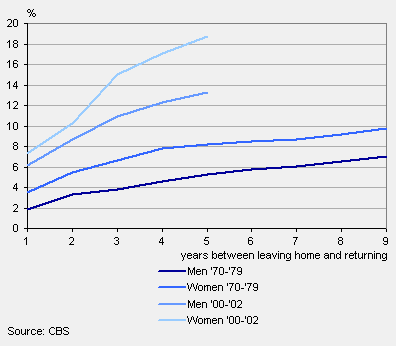Increasing number of boomerang children

An increasing percentage of young adults return to live with their parents for a time after having left home. The main reasons for this increase in the number of ‘boomerang children’ are relationship break-ups and completed or interrupted education.
Main reasons for leaving home, 1970-79 and 2000-07

Leaving home to live independently
The average age at which young women leave home has been between 20 and 21 years for a number of decades now, for men it is around 22 years. The reasons for leaving home have changed in the course of the years, however. Fewer young people leave home to live with a partner or get married. In the 1970s this was the reason for more than half of youngsters to move out of the parental home. In the last decade only one in three men and nearly four in ten women left home for these reasons. Today independence or study are much more common reasons for children to leave home.
Percentage of young people returning to their parents after having left home

One in five young women return to parental home
Seven percent of young women and 10 percent of young men who left home in the 1970s returned to live with their parents for a time. Two decades later, in the 1990s, this was true of 15 percent of both men and women. In the generation who left home at the beginning of the present century the percentage has increased slightly for women. After five years nearly one in five young women have returned to live with their parents. Daughters are more likely to return than sons.
Main reasons for young adults to return to their parents, 1970-79 en 2000-07

Relationship break-ups main reason to return
The most common reason for young adults to return to their parental home is the break-up of a relationship, particularly for women. Students who complete or break off their education are also more likely to return to their parents. In addition, children who temporarily have no accommodation or are waiting for other accommodation return to live with their parents, sometimes along with a partner.
Elma Wobma